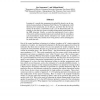Free Online Productivity Tools
i2Speak
i2Symbol
i2OCR
iTex2Img
iWeb2Print
iWeb2Shot
i2Type
iPdf2Split
iPdf2Merge
i2Bopomofo
i2Arabic
i2Style
i2Image
i2PDF
iLatex2Rtf
Sci2ools
NIPS
2000
2000
Learning Continuous Distributions: Simulations With Field Theoretic Priors
Learning of a smooth but nonparametric probability density can be regularized using methods of Quantum Field Theory. We implement a field theoretic prior numerically, test its efficacy, and show that the free parameter of the theory (`smoothness scale') can be determined self consistently by the data; this forms an infinite dimensional generalization of the MDL principle. Finally, we study the implications of one's choice of the prior and the parameterization and conclude that the smoothness scale determination makes density estimation very weakly sensitive to the choice of the prior, and that even wrong choices can be advantageous for small data sets. One of the central problems in learning is to balance `goodness of fit' criteria against the complexity of models. An important development in the Bayesian approach was thus the realization that there does not need to be any extra penalty for model complexity: if we compute the total probability that data are generated by...
NIPS 2000 | NIPS 2007 | Nonparametric Probability Density | Quantum Field Theory | Smoothness Scale |
| Added | 01 Nov 2010 |
| Updated | 01 Nov 2010 |
| Type | Conference |
| Year | 2000 |
| Where | NIPS |
| Authors | Ilya Nemenman, William Bialek |
Comments (0)

